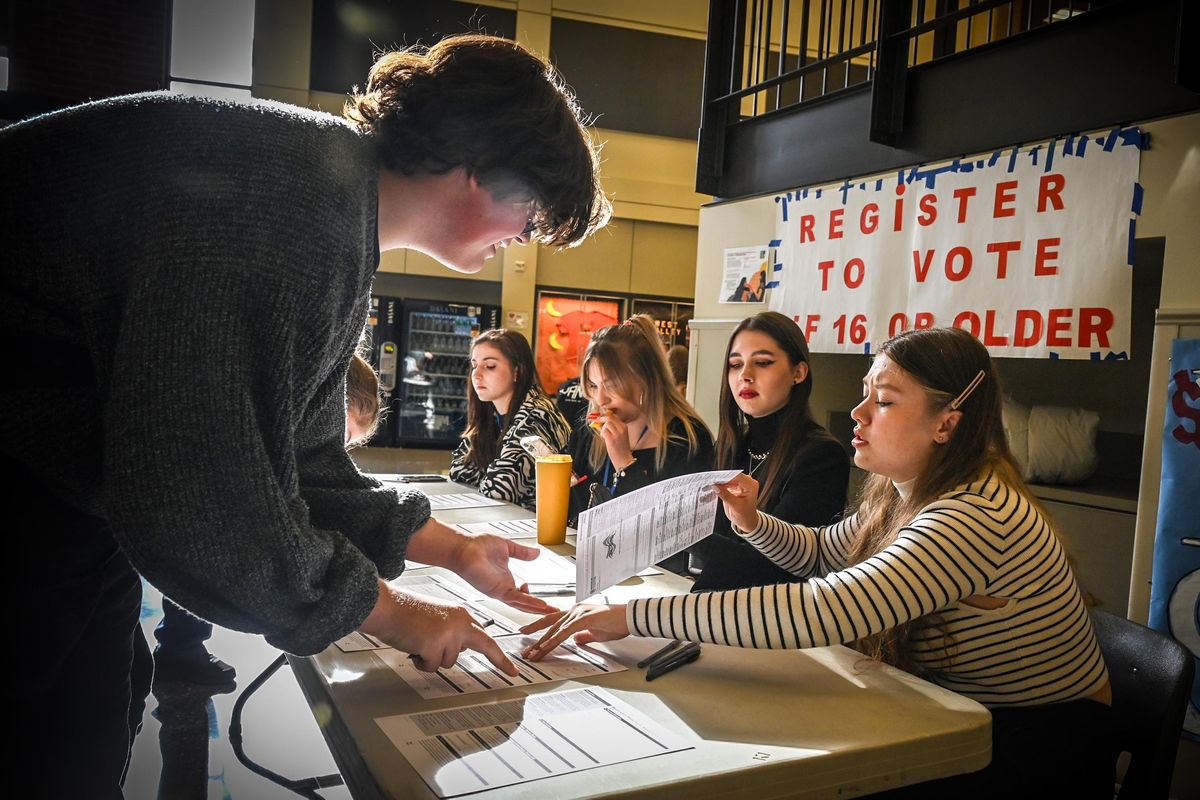Delayed by global pandemic, war, Ukrainian students visit Spokane as part of long-awaited U.S. exchange

About four years ago, Oleh Bodnar was encouraged to apply for the Future Leaders Exchange Program by his English tutor.
It was a long shot. The program run by the U.S. Department of State that offers students from Eastern European and Central Asian countries a scholarship to attend a United States high school for an academic year is extremely competitive.
Bodnar worked hard and got in. He was elated.
Then the COVID-19 pandemic broke out. Bodnar’s cohort was told that they may be able to still complete the program in 2022.
But in February 2022, Russia attacked Ukraine.
“I was really depressed about that, because it was the big expectation, because you wait for a long time and after that everything disappeared,” Bodnar said of finding out the exchange wouldn’t happen again.
Most students in Bodnar’s cohort, including him, had to flee the country. He moved to London, where he is finishing school online while working at a bar and living with a host family.
With all the struggles of his teenage years, it was a huge bright spot to hear that the American Councils for International Education, which administers the FLEX program, created a two-week exchange for the cohort to still experience America.
The group spent one week in Washington, D.C., and a second in Spokane.
For Bodnar, Spokane has provided a deep connection to American culture.
“You can really feel the life and feel the soul of the people who live deep inside this country,” Bodnar said.
The students are staying with host families in Spokane who are part of the Friendship Force, a nonprofit that facilitates travel where members stay with other members in various countries.
While in the United States, the students toured local businesses, hiked, visited Gonzaga University and helped register students to vote at West Valley High School to learn about democracy and American culture.
Anna Dubova, 19, posed for a photo Tuesday while holding out a voter registration form in front of her.
Her friends laughed, snapping away on their cellphones.
The past two years have made Dubova grow up quickly. These two weeks of a cultural exchange have been a chance to reclaim lost time.
“I was supposed to get older fast, to start working, to live alone abroad without my family,” she said. “We are just very old in our 19.”
Dubova lives in Warsaw, Poland, but is studying abroad in Barcelona, Spain. She hopes to become a journalist.
She has been surprised at how interested Americans are in Ukraine.
“Americans are very interested in our culture,” she said. “We want people to know what is going on in our country, because we need your support, and we are very thankful for your help and your support.”
Oleksii (Alex) Barabash, 19, is originally from Melitopol but lives in Berlin, having fled from the war. His hometown, where his grandparents live, is occupied by Russian forces.
He is studying international business management at university. The chance to come to the U.S. for the shortened program was a welcome surprise, he said.
The best part so far has been his host family, a couple in their 70s. Barabash and most of the other students shared their surprise and awe at how active their host families are, frequently leading hikes or getting outdoors to recreate.
“I would like to be the same when I will be 71,” Barabash said.
Clad in black with gems applied to his face, Barabash fit in with the West Valley students all dressed up for Halloween.
He was excited to help them register to vote and get the chance to chat with them about their lives.
“We are representatives of our country,” he said.
Sofia Chybisova, 19, agreed that representing Ukraine has been the best and most difficult part of the trip.
Chybisova is originally from Luhansk but had to flee in 2014 when Russia invaded the Donbas region. Her family moved to Kyiv, where it still lives.
When the war began, Chybisova fled to Potsdam, Germany, and is attending university.
“I love Spokane,” she said, breaking out into a huge smile.
She has a lot in common with her host family. One surprise has been the food – avocado toast has been her favorite so far.
“Everything else seems like too much,” she said with a laugh – too much dressing on her salad, the cake is too sweet and soda is even sweeter.
One thing that has been hard is talking about the war. On Monday, the group met with students at Gonzaga.
Someone asked if the Russian and Ukrainian languages are similar.
“Sometimes, I am getting sensitive,” Chybisova said. “It doesn’t really depend on the question; just, like, sometimes there are days when I can start crying, because someone asked me something.”
Monday was one of those days, and she had to go to the bathroom to cry.
“Sometimes, I am like strong enough to talk about stuff, sometimes not,” she said. “I do have a feeling that I must be this ambassador for Ukraine.”
This weekend, a host family made a comment that the students don’t look like they come from a war-torn country. Chybisova has been wondering since what someone from a war-torn country is supposed to look like.
When she goes home from university to visit her mother in Kyiv, life continues. There are flea markets, bars, shops and events.
“I get the news probably shows just the negative side, but there is also much life in the country,” Chybisova said.
“People should understand that there is still life going on.”